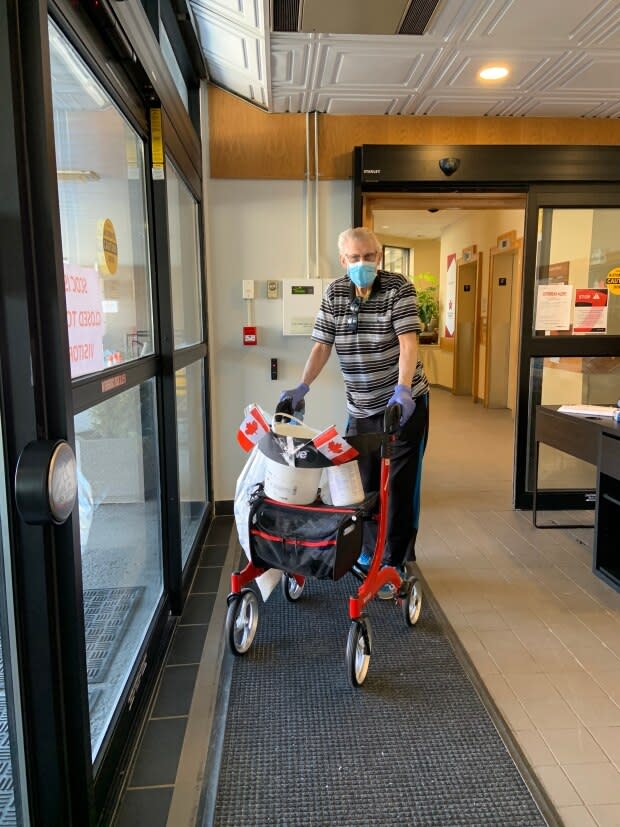How an east-end Toronto hospital is helping long-term care homes fight COVID-19
A hospital in Toronto's east end is reaching out to long-term care facilities in the area to help them stop the spread of the novel coronavirus and protect their vulnerable residents from the ravages of COVID-19.
Michael Garron Hospital at Coxwell and Mortimer avenues has assembled a special team as the pandemic has taken the lives of at least 15 people in long-term care and retirement facilities in Toronto. More than 40 people have died of COVID-19 in long-term care and nursing homes across the province.
St. Clair O'Connor Community Long-Term Care Home is one of eight institutions Michael Garron is helping. It's one of the smallest in Ontario with only 25 beds — and the tight knit environment at the centre has made the loss of four of its residents to COVID-19 especially difficult.
"It's like a family," said Mary Hoare, CEO of the home.
"It's really hard when you know that someone you really care about is ill."
Thirteen additional residents have tested positive for COVID-19 at the facility located at St. Clair Avenue East and O'Connor Drive, and 10 of the centre's staff are also off with the virus.
"We are very, very short staffed," Hoare said.
As the devastating outbreaks continue to plague long term care facilities in Ontario, the new effort led by Michael Garron Hospital's medical director of infection prevention and control has provided relief to this home and seven others in eastern Toronto. Hoare said it's been a life-saver.
"They have been amazing," she said. "I don't know what we would do without them."
Launched two weeks ago, the long-term care collaborative outreach group consists of members from Michael Garron Hospital's infection control team, a geriatrician, nurses and family physicians. The hospital first reached out to the long- term care homes to determine what was needed.

Hoare said at her facility, nurses visited to help hydrate residents who were ill, and the hospital also delivered personal protective equipment for the staff and residents. Daily check-ins have become the norm, she added.
"They call us to ensure we have all the equipment we require so our staff can go in and nurse those people and they stay safe," she said.
The hospital is also offering environmental cleaning services for infected rooms.
"Their rooms are disinfected and also the belongings they have will be properly sanitized before being given back to the families," Hoare added.
Hoare said it's given the home the ability to safely manage the positive cases within the long term care home and avoid sending more cases to Toronto's busy emergency departments.
"If elderly people aren't cared for properly they're going to end up in their emergency rooms."
Preventing cases, building relationships
Dr. Jarred Rosenberg, a geriatrician at Michael Garron Hospital, has been heavily involved in the initiative.
"One area that was identified as a significant concern was [personal protective equipment]," he said.
"And so we have helped all the long-term care facilities that we're working with have the right PPE and address their immediate needs."
Rosenberg said the focus has been preventing the spread of the novel coronavirus among elderly people who are vulnerable, adding there are approximately 50,000 seniors in eastern Toronto.
"We've supported physicians in all the long-term care facilities and homes in our area, providing education for families and residents about COVID-19 and we're helping facilitate discussions on their goals of care in the context of a pandemic," the doctor explained.

The team is also working to expedite the screening process at the area's long-term care homes "to make sure there is a timely diagnosis and to prevent spread."
Rosenberg believes the work being done now will continue to benefit the community after the pandemic is over.
"As devastating as COVID has been, the relationships we've been able to build and the incredible response that we've had from long-term care facilities has been incredibly rewarding as a geriatrician and for the rest of the team," he said.
"We hope some of these relationships we've built will grow and flourish well beyond the COVID pandemic."
Guidance from the province
In an emailed statement to CBC News, Gloria Yip, a spokesperson for the Ministry of Health and Long-Term Care, said homes should be communicating with local hospitals if there's an outbreak, "including how many residents are in the facility, and how many may potentially be transferred to hospital if ill, based on advanced care directives."
"Residents with severe illness should be transferred to hospital by ambulance," the statement said.
The ministry released guidance for long-term care homes with COVID-19 cases and outbreaks, saying testing should be conducted for every symptomatic resident in homes, and home should inform paramedics and the hospital when residents are being transferred.
Hoare said she knows there will be challenging days ahead, but the help from Michael Garron Hospital has made it far more manageable.
"They're a source of encouragement," she said.
"You call them when you're down and you don't know what to do about something and they give us advice," Hoare added.
"They tell you, 'We're going to get through this together.'"


